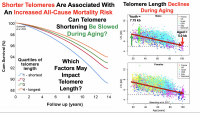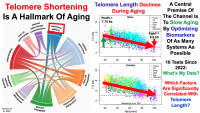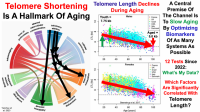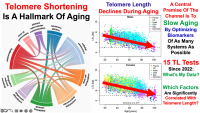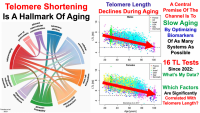
Longer Telomere Length In 2023 vs 2022 (Also, Correlations With Diet)
#1
Posted 13 September 2023 - 08:55 PM
#2
Posted 31 December 2023 - 03:16 PM
#3
Posted 18 February 2024 - 12:11 PM
sponsored ad
#4
Posted 22 February 2024 - 09:05 AM
I was going to suggest taking WBCs to ensure that increases in TL are not merely due to less division - but then I found a much more serious issue with what you are doing.
You are not actually measuring telomere length (of leukocytes) you are measuring a methylation proxy of telomere length.
In this paper (https://www.aging-us...cle/102173/text) they showed that even immortalising cells, the methylation based telomere clock still advanced, even though the telomeres weren't shortening. This conclusively shows they weren't measuring telomere length. It is probably something else related to cell division. And the whole point (to my mind) of intervening in telomeres, is that you can continue to have proper and normal cell division (for example in the immune cells), and not just reduce WBCs/ slow division, which would only be viable as a way to preserve telomeres if you lived in a pathogen free bubble!
So sorry Michael, you are not addressing the telomere hallmark with this testing.
As usual with most things telomere, I discussed this before (in 2022), here.
Edited by QuestforLife, 22 February 2024 - 09:06 AM.
#5
Posted 26 February 2024 - 06:11 PM
Yes, thanks for your insight, QuestforLife, I'm aware that their TL measurement is a DNAm-based estimation. From the paper that you cited, it shows DNAm-based TL estimation to be superior to leukocyte-quantified TL, so the epigenetic approximation has some comparative strengths.
TruDiagnostic mentioned that when their DNAm TL estimation is below the 20th percentile based on age, it may be thought of as a senescent cell marker, which ties into your comment.
#6
Posted 27 February 2024 - 10:57 AM
Yes, thanks for your insight, QuestforLife, I'm aware that their TL measurement is a DNAm-based estimation. From the paper that you cited, it shows DNAm-based TL estimation to be superior to leukocyte-quantified TL, so the epigenetic approximation has some comparative strengths.
TruDiagnostic mentioned that when their DNAm TL estimation is below the 20th percentile based on age, it may be thought of as a senescent cell marker, which ties into your comment.
The point of measuring telomeres is to get a read on how that aspect of aging is influenced by your interventions. As you rightly point our in your video, telomere length is a hallmark of aging - a so-called primary hallmark - that influences other hallmarks like genomic stability and cellular senescence. So it is something we want to be able to measure.
The fact that there are other measures of aging that may map better to chronological age or to health outcomes is beside the point. Methylation based aging clocks are a black box in the sense that we don't know if they are a cause or consequence of aging (or both) or even whether if you reverse age according to such a clock, are you actually reversing aging or just the clock. There is no obvious mechanistic link other than vague claims of gene regulation. The case in point is the leukocyte methylation telomere clock, which doesn't measure telomeres at all! It advances with cell divisions regardless of the telomere length, so we don't know if you did stop telomere shortening if the clock would continue to have predictive power for health outcomes or not. My guess is that more cell divisions simply puts more strain on the DNA regulatory machinery, including but not restricted to de/re-methylation. The only purpose of this clock that I can see, would be to get a read on how many cell divisions your leukocytes are typically experiencing until they are replaced. But it may be that all methylation based clocks can give you this information, as there is evidence many are inversely correlated with telomere length.
Telomere measurements may be expensive, they may be inaccurate, it may be that we don't even want telomeres to be too long anyway, but at least they have a clear mechanistic link to cell proliferation capacity, cell senescence, etc. So you can't just replace them with a methylation based proxy. If you want a proxy for leukocytes TL, you might be better off looking at a simple blood test giving you NLR and CRP.
#7
Posted 14 July 2024 - 11:09 AM
#8
Posted 28 August 2024 - 02:04 PM
2 user(s) are reading this topic
0 members, 2 guests, 0 anonymous users






























